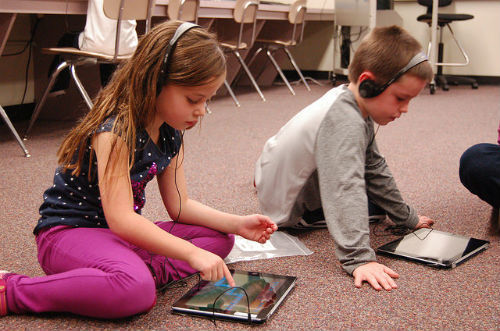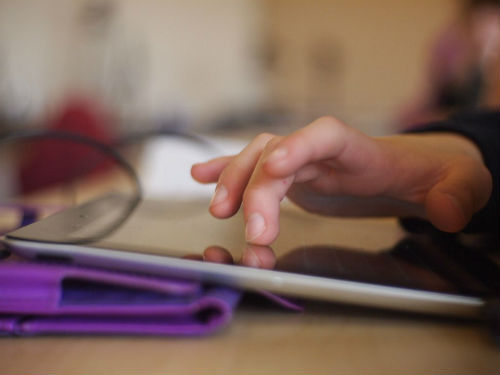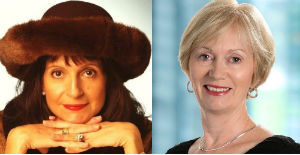
"The use of online assessment tools is giving teachers a more fine-grained understanding of individual students' skills, and assisting them to determine the necessary next steps to enable them to achieve their own learning goals. We are seeing more effective differentiation in classrooms as a result." -- Susan Mann
I am delighted to welcome back today to The Global Search for Education, Susan Mann, CEO of Education Services Australia, which is owned by all Australian education ministries and focused on technology and service support for the Australian education and training sectors. Susan has played a key role in the conceptualization and support for national ICT policy in Australian school education. She led the initiative that began as the Learning Federation and has continued in a number of iterations to produce digital content, distribution architecture and content development standards for all Australian schools. Mann will be sharing further perspectives on ICT support at The Education Partners "Learning from high-performing school systems to improve education for all" panel in Sydney on February 20th.
I caught up with her to get the latest tech report from Australia.

"Intercultural understanding is a key dimension of the Australian Curriculum. The deployment of technology opens up opportunities for global partnerships and collaboration to grow, increasing opportunities for greater understanding between cultures." -- Susan Mann
Susan, what's new since we last chatted - where does implementation of technology among teachers in the classroom and with student learning stand?
Technology has become further integrated into the daily operations of most Australian schools. All teachers are now required to implement the Australian Curriculum, published solely online and linked directly to digital curriculum, assessment and teacher professional development resources.
The entire teacher workforce can now collaborate nationally on innovations in practice that address the problems they encounter in implementing the new Curriculum using Scootle Community, an online network that uses analytics to detect patterns in teacher practice and recommends content and connections to support teachers' organization and co-creation.
We are seeing an increase in the use of mobile devices and Chromebooks. App-based environments are becoming increasingly favoured for their ease of use and flexibility. Many schools have purchased 3D printers and are incorporating these into their learning programs.
There is an increasing expectation that parents and students will have direct access to online programs and reporting tools to monitor progress. There is a level of adoption of analytics programs to inform whole school planning and monitor student outcomes.
These advances are in a context where there has been no recent federal policy on the use of IT in schools and a significant reduction in federal funding to support its implementation.

"An ongoing challenge for Australia is ensuring equity of access to technology. Since the decline in federal funding, many schools are reverting to bring Your Own Device (BYOD) programs and this puts the onus back on families to fund devices."
-- Susan Mann
What improvement in student outcomes do you attribute to technology engagement? What have been the main drivers?
Engagement in learning leads to enhanced student outcomes. Teachers are continuing to report increased student engagement through their students' involvement in digital learning. Enquiry-based, problem-based and exploratory learning are all facilitated by the use of technology and students are increasingly supported by new technologies to take control of their learning through accessing resources, monitoring their progress and connecting with peers to gain feedback.
The key to improving outcomes is to ensure that teachers continue to develop the skills to drive their students' collaboration, problem-solving and higher-order thinking. The use of online assessment tools is giving teachers a more fine-grained understanding of individual students' skills, and assisting them to determine the necessary next steps to enable them to achieve their own learning goals. We are seeing more effective differentiation in classrooms as a result.
How is deployment of technology impacting global competence and global citizenship?
Intercultural understanding is a key dimension of the Australian Curriculum. The deployment of technology opens up opportunities for global partnerships and collaboration to grow, increasing opportunities for greater understanding between cultures. Australian students studying Mandarin, Indonesian and Japanese languages can now access the Language Learning Space that offers access to native-language tutors based in China, Japan and Indonesia and provides opportunities for students to engage more fully and deeply in other cultures in the course of their language learning. The development of global citizenship is supported by collaborative tools that are now becoming more fully embedded in classroom practice.

"Raising parent awareness on how to support their students to be safe, responsible and discerning users of technology continues to be a challenge." -- Susan Mann
What do you believe are the key remaining challenges ahead to full integration into learning?
The pace of technological change requires an expert teacher workforce that is flexible, knowledgeable and skilled in understanding how best to leverage the use of technology to enhance student learning. The new Digital Technologies curriculum will provide challenges for teachers in its early implementation phase.
Curriculum and assessment frameworks also need to reflect contemporary practice. Australia has a moved towards an online national curriculum supported by digital resources, and is already administering sample online national assessment and moving to an online system for full cohort national testing; but at the same time, traditional pen and paper testing remains a feature of many states' final year assessment regimes.
An ongoing challenge for Australia is ensuring equity of access to technology. Since the decline in federal funding, many schools are reverting to bring Your Own Device (BYOD) programs and this puts the onus back on families to fund devices.
Raising parent awareness on how to support their students to be safe, responsible and discerning users of technology continues to be a challenge.
For more information on Education Services Australia
For more information on The Education Partners
(All photos are courtesy of Education Services Australia)
Join me and globally renowned thought leaders including Sir Michael Barber (UK), Dr. Michael Block (U.S.), Dr. Leon Botstein (U.S.), Professor Clay Christensen (U.S.), Dr. Linda Darling-Hammond (U.S.), Dr. MadhavChavan (India), Professor Michael Fullan (Canada), Professor Howard Gardner (U.S.), Professor Andy Hargreaves (U.S.), Professor Yvonne Hellman (The Netherlands), Professor Kristin Helstad (Norway), Jean Hendrickson (U.S.), Professor Rose Hipkins (New Zealand), Professor Cornelia Hoogland (Canada), Honourable Jeff Johnson (Canada), Mme. Chantal Kaufmann (Belgium), Dr. EijaKauppinen (Finland), State Secretary TapioKosunen (Finland), Professor Dominique Lafontaine (Belgium), Professor Hugh Lauder (UK), Professor Ben Levin (Canada), Lord Ken Macdonald (UK), Professor Geoff Masters (Australia), Professor Barry McGaw (Australia), Shiv Nadar (India), Professor R. Natarajan (India), Dr. Pak Tee Ng (Singapore), Dr. Denise Pope (US), Sridhar Rajagopalan (India), Dr. Diane Ravitch (U.S.), Richard Wilson Riley (U.S.), Sir Ken Robinson (UK), Professor PasiSahlberg (Finland), Professor Manabu Sato (Japan), Andreas Schleicher (PISA, OECD), Dr. Anthony Seldon (UK), Dr. David Shaffer (U.S.), Dr. Kirsten Sivesind (Norway), Chancellor Stephen Spahn (U.S.), Yves Theze (LyceeFrancais U.S.), Professor Charles Ungerleider (Canada), Professor Tony Wagner (U.S.), Sir David Watson (UK), Professor Dylan Wiliam (UK), Dr. Mark Wormald (UK), Professor Theo Wubbels (The Netherlands), Professor Michael Young (UK), and Professor Minxuan Zhang (China) as they explore the big picture education questions that all nations face today.
The Global Search for Education Community Page
C. M. Rubin is the author of two widely read online series for which she received a 2011 Upton Sinclair award, "The Global Search for Education" and "How Will We Read?" She is also the author of three bestselling books, including The Real Alice in Wonderland, is the publisher of CMRubinWorld, and is a Disruptor Foundation Fellow.

